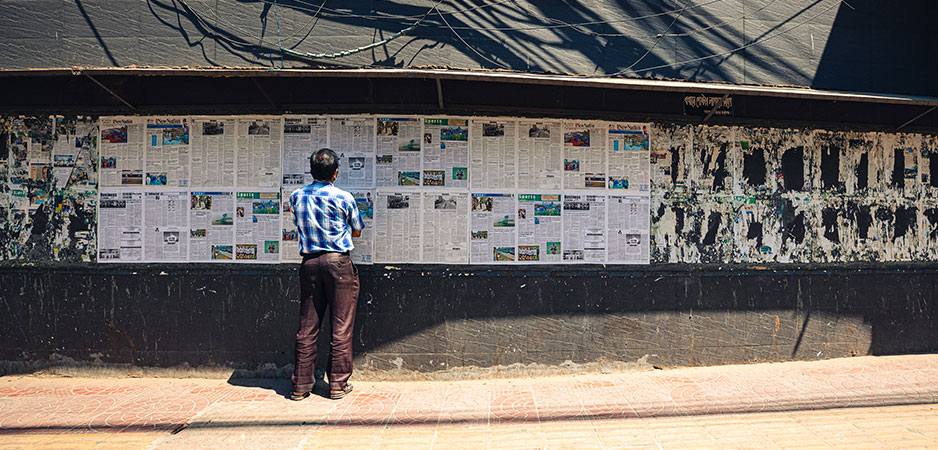
The COVID-19 pandemic is dominating
the news, and rightly so. This pandemic is a human rights crisis, and millions
of people are at risk. However, it is crucially important that the media
continue to report on what else is happening in different countries around the
world. In the midst of the coronavirus crisis, a journalist has gone missing in
Bangladesh. His story deserves to be told.
Shafiqul Islam Kajol, the editor of the daily newspaper Dainik Pokkhokal, has been missing for six weeks. On March 10, he went to his newspaper’s office in Dhaka. A few hours later, he left the building, got on his motorbike and drove away. He did not return home to his family that evening and has not been seen since. His family fears that he could be a victim of enforced disappearance, and his son, Monorom Polok, has published a heartbreaking letter to his father.
Suspicions have been heightened since Amnesty International obtained CCTV footage from outside Kajol’s office on the day of his disappearance. This shows a number of unidentified men watching his motorbike for nearly three hours before he left the building and, at one point, appearing to tamper with it. The family reported his disappearance to the police the next day, but the authorities initially refused to act and have denied that he is in police custody.
Worrying Timing
But the timing of Kajol’s disappearance is worrying. The day before, the government opened an investigation against him and 31 other prominent journalists under the country’s infamous Digital Security Act 2018, which has been described by Amnesty as an attack on freedom of expression. The journalists are accused of publishing “offensive, false and defamatory news” on Facebook.
These allegations are similar to those made against the award-winning photojournalist and TIME Magazine Person of the Year, Shahidul Alam, who was arrested at his home in 2018. He was charged with making provocative comments in an Al-Jazeera interview, in which he criticized the government for extrajudicial killings, disappearances, corruption, bribery and rigging the quota system for government jobs. Thankfully, due to an international outcry — including questions raised in the UK Parliament — Shahidul was granted permanent bail. Upon his release, he said: “It is a fantastic feeling to be free in a free country, breathing free air. But I hope for freedom for everyone else.”
But there has been very little coverage of Kajol’s disappearance as it has been completely eclipsed by coronavirus reporting. Amnesty International has called on the Bangladeshi government to launch an urgent investigation into his disappearance and, if he is in state custody, to release him, but this has not been picked up by the media yet.
Bangladesh has a sad history of enforced disappearances and currently ranks 151 out of 180 countries in the Reporters Without Borders Press Freedom Index. According to the International Federation for Human Rights, these have significantly increased since the ruling Awami League came into power under Prime Minister Sheikh Hasina in 2009, and the systematic nature of targeting “suggests that enforced disappearances are being used as a political tool by the government to silence criticism and dissent.”
The families of those who go missing suffer a unique kind of torture, never knowing what has happened to their loved ones, always hoping that they are alive but constantly fearing the worst. It is a pain that most of us cannot even imagine.
Fearing
the Worst
Last year, the Bangladesh-based human rights organization, Odhikar, documented at least 34 incidents of alleged enforced disappearances. Eight of them were later found dead, 17 had been arrested, while the whereabouts of the other nine remain unknown.
One disappearance that remains unsolved is that of Ahmad bin Quasem. Quasem is a Bangladeshi lawyer who was called to the bar in the UK. He was abducted while representing his father, a senior opposition leader, before a tribunal set up by the Bangladeshi government to prosecute crimes committed during the Liberation War against Pakistan. On August 9, 2016, a group of plain-clothed police officers entered his apartment without a warrant and dragged him into an unmarked van. He has not been seen since, and his family, including two young daughters, fear the worst. They may never know what has happened to him. His father was hanged a month after Quasem disappeared.
We must not allow Kajol’s disappearance to be forgotten. If his story remains in the shadow of the global pandemic, we may never find out what has happened to him. He does not deserve this. His family does not deserve to suffer the pain of never knowing. We need to shine the media spotlight on his case and call on the Bangladesh government to launch an investigation immediately. It was the international outcry that saved Shahidul Alam’s life. Now we need to save Shafiqul Islam Kajol.
The
views expressed in this article are the author’s own and do not necessarily
reflect Fair Observer’s editorial policy.


